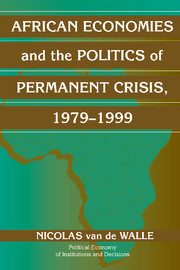Book contents
- Frontmatter
- Contents
- List of Tables
- Acknowledgments
- Introduction
- 1 Approaches to Africa's Permanent Crisis
- 2 Patterns in Reform Implementation, 1979–1999
- 3 Decision Making in Postcolonial Africa
- 4 State Responses to the Permanent Crisis
- 5 The Crisis and Foreign Aid
- 6 Democratization and the Prospects for Change
- 7 Conclusion
- Index
- Title in the Series
6 - Democratization and the Prospects for Change
Published online by Cambridge University Press: 05 June 2012
- Frontmatter
- Contents
- List of Tables
- Acknowledgments
- Introduction
- 1 Approaches to Africa's Permanent Crisis
- 2 Patterns in Reform Implementation, 1979–1999
- 3 Decision Making in Postcolonial Africa
- 4 State Responses to the Permanent Crisis
- 5 The Crisis and Foreign Aid
- 6 Democratization and the Prospects for Change
- 7 Conclusion
- Index
- Title in the Series
Summary
The spread of the “third wave” of democratization to Africa in the early 1990s represented the most significant political change in the continent since the independence period three decades before. Throughout the continent, significant political liberalization resulted in the emergence of a free press, opposition parties, independent unions and a multitude of civic organizations autonomous from the state. In twenty-nine, out of forty-seven states in the region, the first multiparty elections in over a generation were convened between 1990 and 1994. In a smaller set of countries, elections were fully free and fair and resulted in the defeat and exit from power of the erstwhile authoritarian head of state. By the end of the decade, only a small minority of states were not officially multiparty electoral democracies, even if the practice of democratic politics was often far from exemplary.
Has the new, more open, political climate undermined economic reform in Africa? Has there been a negative (or positive) correlation between economic and political reform in the 1990s? What has been the impact of democratization on the patterns described in earlier chapters? It is important to understand the impact of democratization on African economies because it can provide real insights into the dynamics of change in Africa's political economy.
At the beginning of the 1990s, the dominant point of view among observers of the African scene appeared one of optimism about the region's politics, but pessimism about its economic prospects. Rather curiously, today that assessment seems reversed.
- Type
- Chapter
- Information
- Publisher: Cambridge University PressPrint publication year: 2001



